Mac notebook and other portable computing is covered in The 'Book Review. iPad, iPod, iPhone, and
Apple TV news is covered in iOS News
Review. All prices are in US dollars unless otherwise noted.
News & Opinion
Software
News & Opinion
StatCounter: Chrome Overtakes Internet Explorer
Globally for an Entire Month
PR: After weeks of speculation, Google's Chrome has unseated
Microsoft Internet Explorer to become the world's top Internet browser
for the first time for a full calendar month in May, according to
StatCounter, an independent website analytics company. The firm's
research arm StatCounter Global Stats says that Chrome surpassed IE for
the first full day back in March and the achievement of the weekly
milestone was widely reported on May 21.
For the full month of May according to StatCounter data from over 15
billion page views, Chrome took 32.43% of the worldwide market compared
to 32.12% for IE and 25.55% for Firefox.
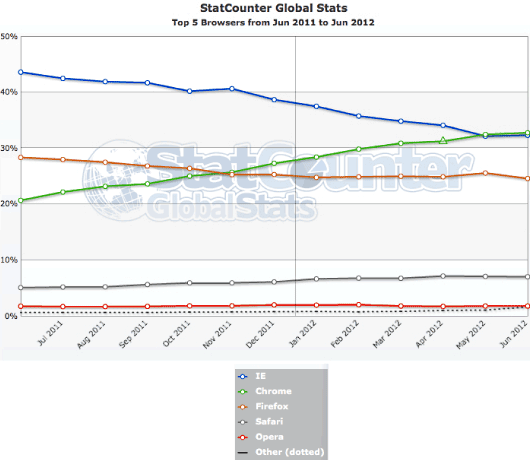
StatCounter says that a battle royal has broken out between Chrome,
IE, and Firefox. While attention has recently been focused on the
battle between Chrome and IE, not-for-profit Mozilla's Firefox with its
loyal membership base should not be underestimated, comments Aodhan
Cullen, CEO, StatCounter. He points out that an upswing of over 0.6% in
Firefox usage from April to May 2012 (apparently at the expense of IE)
helped to push Chrome into pole position.
"The browser wars are back with a vengeance," says Cullen. "This
time there are three major players competing for the top spot but,
ultimately, the real winner will be the end user who can look forward
to more choice and innovation as a result of this increased
competition."
In a stunning display of growth, Chrome has gone from zero to market
leader on a worldwide basis in less than four years. That said, while
IE has ceded the top spot to Chrome for May 2012, Microsoft's newest
browser version (IE 9) is performing well and Firefox is holding
its own.
In the US, IE remains the dominant browser, as it also is in the
UK.
StatCounter Global Stats has recently launched a new map feature
that clearly illustrates the increasing global usage of Chrome. The
increase is particularly evident when mapped data from May 2011 and May
2012 is compared both IE and Firefox cede a significant number of
countries to Chrome over the period.
Link: StatCounter
Global Stats
Net MarketShare: Firefox Second Place in World
Browser Share Behind IE
Ars Technica's Peter Bright reports that based on Net MarketShare
data, Internet Explorer still dominates worldwide at 49.46% combined
browser share in June 2012, followed by Firefox at 18.35% and Chrome at
17.46%. Apple's Safari browser takes the #4 spot with 9.72%, and Opera
rounds out the top five at 2.32%.
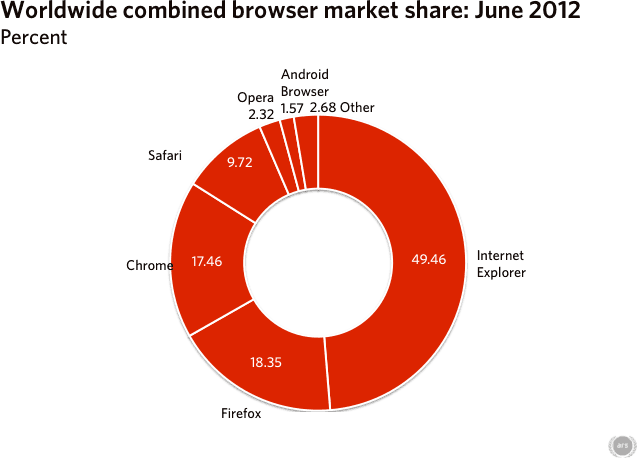
On PCs (as opposed to tablets), the ordering is the same, but the
numbers are different. IE has 54.0% share, Firefox 20.06%, Chrome
19.08%, Safari only 4.73%, and Opera just 1.60%.
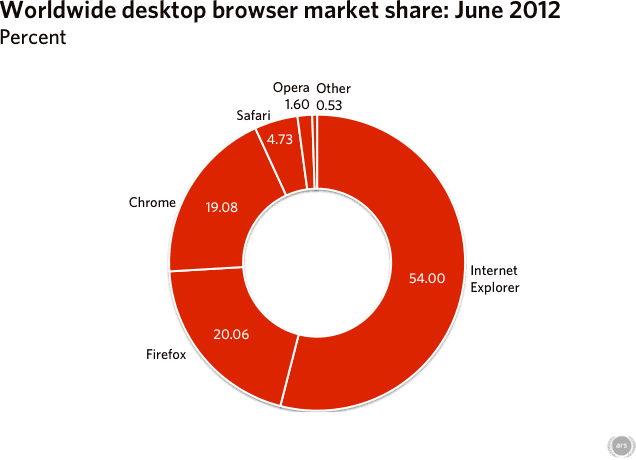
Everything changes on mobile platforms, where Safari totally
dominates at 65.79% - almost two-thirds of the market. This is followed
by Android Browser at 19.17%, Opera Mini at 10.45%, and BlackBerry's
browser at 1.63%. No other mobile browser has even 1% of the market,
with IE at 0.67% and sixth place - quite the contrast to its desktop
dominance.
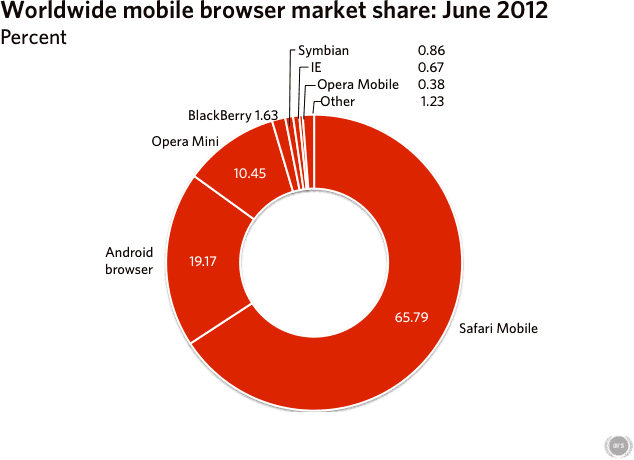
Why StatCounter and Net MarketShare have such different numbers and
conclusions is a mystery, with StatCounter giving Chrome the top spot,
IE second, and Firefox third while Net MarketShare finds IE on top,
Firefox in second place, and Chrome trailing at third.
The article also makes some interesting observations about the
adoption rate for updated browser versions, where Chrome, with its
transparent update system, has the vast majority of its users on the
latest version in short order. By contrast, Firefox still has quite a
few users on version 3.6, that last version before it launched its
rapid update initiative, which still tends to be the #2 or #3 version
of Firefox in use at any given time. Firefox users are also slower to
update to a newer version than Chrome users.
Link:
Firefox Fights Back, Holds On to Second Place in World Browser
Share
Will Microsoft's Kinect Leap Obsolete the
Mouse?
Like many other prognosticators, Fortune's J.P. Mangalindan contends
that touchscreen gesture recognition will make the computer mouse
obsolete, contending that after more than 40 years of mouse
development, the arrival of smartphones followed by the iPad and other
media tablets - all touchscreen enabled - has narrowed "the
communication gap between man and machine (allowing, for example, very
young children to became savvy computer users)."
Some, including your editor, beg to differ, at least in the context
of quality of communication, and prefer the pinpoint precision and
button-mediated positive control enabled by mouse, touchpad, or even
trackball input to the vagueness and ambiguity of touchscreens.
Mangalindan cites scientist and entrepreneur John Underkoffler
arguing that "Gesture is the richest possible digital input that we, as
humans, can deliver," and that "spatial operating environments" are
sensitive enough to pick up movements as slight as a quivering finger.
Yes, and that would be part of the problem with them from some
perspectives.
The article notes that the next generation of Microsoft's Kinect
gesture-recognition hardware is due this winter, dubbed Leap, claimed to have 100 times the
accuracy of the original Kinect product but to cost less than half as
much (around $70) in a more compact form factor and compatible with
Macs and PCs.
Mangalindan predicts that soon the mouse will no longer feel like a
throwback but will simply be obsolete.
We'll see.
Link: Replacing the
Mouse: No Small Gesture
Study Finds Mac Users Buy More Long Term Care
Insurance
An
article in the Wall Street Journal reveals that users of Macintosh
computers who visit travel site Orbitz spend an average of $30 more per
night on hotels than their Windows PC counterparts. With higher
per-capita income and different buying patterns, a new study indicates
that Macintosh computer users also purchase bigger long-term care
insurance policies, and more often.
A study of 184,000 visits to long-term care insurance shopping site
LTC Tree found that one's choice of computing platform may reveal more
than just hotel buying habits. Macintosh users are 14.1% more likely to
buy long-term care coverage than Windows users, and they are likely to
buy policies that are 9.3% more expensive, on average.
The immediate question is: Are Mac users more attuned to the risk of
needing long-term care in the future, or are they just bigger consumers
overall? A 9.3% increase in premiums would amount to an extra year of
coverage on a typical long-term care policy, estimates Drew Nichols,
cofounder of LTC Tree.
An avid technologist, Nichols wanted to include Linux users in the
study despite the lower market share the operating system commands. The
venerable Open Source operating system, which is freely available and
adopted by higher-tech users generally, was analyzed in the study and
added to the mysterious differences between users of various computing
operating systems. The trait of thrift that leads to using a free open
source operating system equates to an average long-term care premium
that is 30% less on average than premiums of Mac users. Linux users
were also found to purchase long-term care insurance at nearly half the
rate of Mac users.
LTC Tree is an online long-term care insurance shopping site that
allows consumers to shop a market of top-rated insurance carriers
without the need to meet an agent face-to-face for a high-pressure
sales meeting. With 10,000 baby boomers retiring each day, the
awareness of need for long-term care protection is on the rise. What is
not on the rise is the tired old sales approach that is often used to
sell long-term care insurance policies at the kitchen table. LTC Trees
approach focuses more on distance learning concepts and encourages
comparison and competition of various insurers.
Link: LTC
Tree
Software
Day-O Free Menu Bar Clock for OS X
PR: Day-O is a simple, free menu bar clock replacement with a
simple calendar for your Mac.
The developer explains how Day-O came to be:
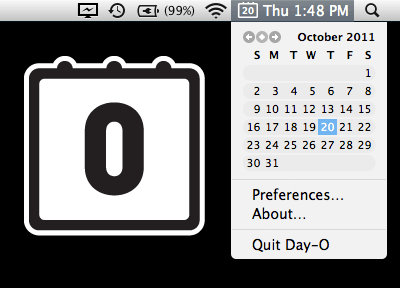 My late upgrade to Lion was
relatively painless. The only casualty was MenuCalendarClock. It somehow
clobbers the Dictionary shortcut key command and gesture which I use
daily (if not hourly). I thought I could live without MMC. I don't use
any calendar apps, so I was just using the free version for the simple
date icon and convenient fly-out calendar. I thought the system menu
clock would suffice. Really, how frequently did I use the fly-out
calendar?
My late upgrade to Lion was
relatively painless. The only casualty was MenuCalendarClock. It somehow
clobbers the Dictionary shortcut key command and gesture which I use
daily (if not hourly). I thought I could live without MMC. I don't use
any calendar apps, so I was just using the free version for the simple
date icon and convenient fly-out calendar. I thought the system menu
clock would suffice. Really, how frequently did I use the fly-out
calendar?
Turns out, quite a bit. I tried a few replacements but couldn't
stand any of their date icons. MMC developer Objectpark seems to have
gone quiet. Fortunately, as I quipped on Twitter, I've never met a
wheel I didn't want to reinvent.
I was able to piece something together from various NSStatusItem
tutorials, the NSDatePicker Class Reference, Stack Overflow answers and
GitHub repositories.

MagiCal shows time & date in menubar.
Publisher's note: I'm not yet using OS X 10.7 Lion, so I can't speak to how
well it might work there, but I've been using MagiCal on my OS X
10.4, 10.5, and 10.6 Macs for years now. It's icon in the menu bar
shows the current date, and it pops open a calendar quickly. The
current version of this free app requires OS X 10.5 Leopard or later, but an
earlier version for 10.4 Tiger
is still available for download. dk
Link: Day-O
Desktop Mac
Deals
Low End Mac updates the following price trackers monthly:
For deals on current and discontinued 'Books, see our 13" MacBook and MacBook Pro,
MacBook Air, 13" MacBook Pro, 15" MacBook Pro, 17" MacBook Pro, 12" PowerBook G4, 15" PowerBook G4, 17" PowerBook G4, titanium PowerBook G4,
iBook G4, PowerBook G3, and iBook G3 deals.
We also track iPad,
iPhone, iPod touch, iPod classic, iPod nano, and iPod shuffle deals.





 My late upgrade to Lion was
relatively painless. The only casualty was
My late upgrade to Lion was
relatively painless. The only casualty was 
